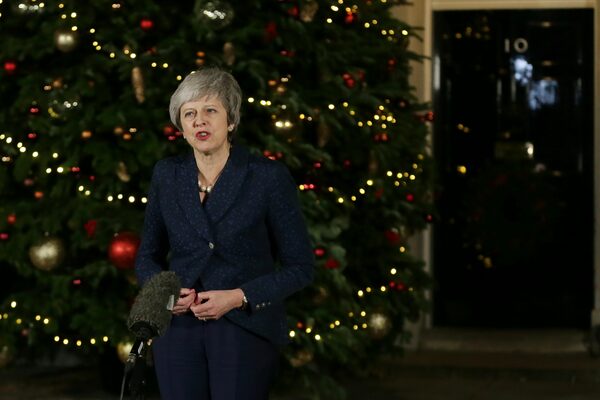
British Prime Minister Theresa May makes a statement outside 10 Downing Street, in London, on Dec. 12, 2018.Tim Ireland/The Associated Press
British Prime Minister Theresa May has survived a leadership challenge – but her authority has been badly damaged and she faces an uphill battle to win parliamentary support for a Brexit deal she’s reached with the European Union.
On Wednesday, Ms. May won a vote of non-confidence in her leadership of the Conservative Party, receiving the backing of 200 Tory MPs while 117 voted against her. It’s a victory for Ms. May in a long-running revolt inside the Tory party caucus, but it came at a cost and didn’t resolve the deep divisions that threaten Ms. May’s Brexit deal. Ms. May had to promise to step aside before the next election and some Tory rebels said her margin of victory was too narrow for her to remain in office.
In a statement after the vote, Ms. May hailed her win but also acknowledged the dissenters. “Whilst I’m grateful for that support, a significant number of colleagues did cast a vote against me and I have listened to what they said.” She also showed no signs of backing away from her Brexit strategy and said that “following this ballot, we now need to get on with the job of delivering Brexit for the British people and building a better future for this country.”
Related: Theresa May to step down before Britain’s next election
The vote will do little to ease the growing opposition to the Brexit deal Ms. May struck with the European Union last month. On Monday, she suffered the humiliation of having to defer a vote on the deal in the House of Commons after it became clear it would be soundly rejected. Some of the harshest criticism came from about 100 Tory MPs and they remain firmly opposed to the deal, along with all opposition parties. Wednesday’s vote “still leaves exactly the same parliamentary arithmetic we had before this [leadership] challenge began,” said Robert Ford, a professor of political science at the University of Manchester. “There’s not a majority for May’s deal. There’s not a majority for any alternative. There’s not a majority for a general election and there’s not a majority for a second [Brexit] referendum.”
Ms. May has vowed to seek changes to the deal to win over critics. She plans to make her case on Thursday to EU leaders at the start of a two-day summit in Brussels. So far, EU officials have been steadfast in saying they won’t reopen the agreement. And while the EU has promised to make a statement on Brexit after Thursday’s meeting, there is little expectation the announcement will be enough to satisfy Ms. May’s opponents. Now that she’s also agreed to step down as Prime Minister at some point, she has likely weakened her position further and could be seen as a lame duck leader who won’t be around when the United Kingdom and the EU begin lengthy talks on a broader agreement covering trade, security and a host of other matters. Those discussions are set to begin once the U.K. leaves on March 29 and could take years to complete.
Ms. May’s immediate problem is finding a solution to the so-called backstop, a key provision in the 585-page withdrawal agreement that kicks in if both sides have failed to negotiate a broader trade deal within three years. The backstop would keep the U.K. within a customs arrangement with the EU and tie Northern Ireland even closer to the bloc to ensure there was no hard border with Ireland. Tory rebels argue the backstop has no time limit and that it can’t be revoked unilaterally by the U.K., which they say undermines British sovereignty and nullifies the country’s decision to leave the EU.
Ms. May is trying to resolve both issues but EU and Irish officials have insisted the backstop can’t be modified. On Wednesday, a group representing all parties in the European Parliament, which must ratify the deal, also said it won’t support changes. In a statement, the group known as the conference of presidents said “renegotiating the backstop was not possible since it is the guarantee that in whatever circumstances there could be no hardening of the border on the island of Ireland.” It added that “without a backstop parliament would not give its consent to the withdrawal agreement.”
Ms. May has insisted she has made progress in talking to some EU leaders this week, and on Wednesday, she said that during the EU summit, she will be seeking “legal and political assurances that will assuage the concerns that Members of Parliament have on that issue.” Many Tory MPs have said that assurances will be insufficient if the legal text isn’t changed or the backstop isn’t scrapped.
The political turmoil has left many businesses worried about what will happen if Brexit goes badly and the U.K. abruptly leaves on March 29 without any access to the EU’s single market, which allows the free movement of people, goods and services. Some business groups expressed exasperation at the Tory infighting on Wednesday. “At one of the most pivotal moments for the U.K. economy in decades, it is unacceptable that Westminster politicians have chosen to focus on themselves, rather than on the needs of the country,” said Adam Marshall, director general of the British Chambers of Commerce.
For many people, such as Jennifer Thompson, the whole Brexit saga has become unnerving. She’s no fan of Ms. May and didn’t support Brexit. As she stood outside Westminster on Wednesday evening with her son, Jim, Ms. Thompson just shook her head at the political wrangling. “It’s all become a bit of a joke,” she said. Just down the sidewalk, Grant Mesie laughed at the political mayhem. “I don’t think anyone thought Brexit would be this complicated,” he said. “We just need some clarity.”
 Paul Waldie
Paul Waldie